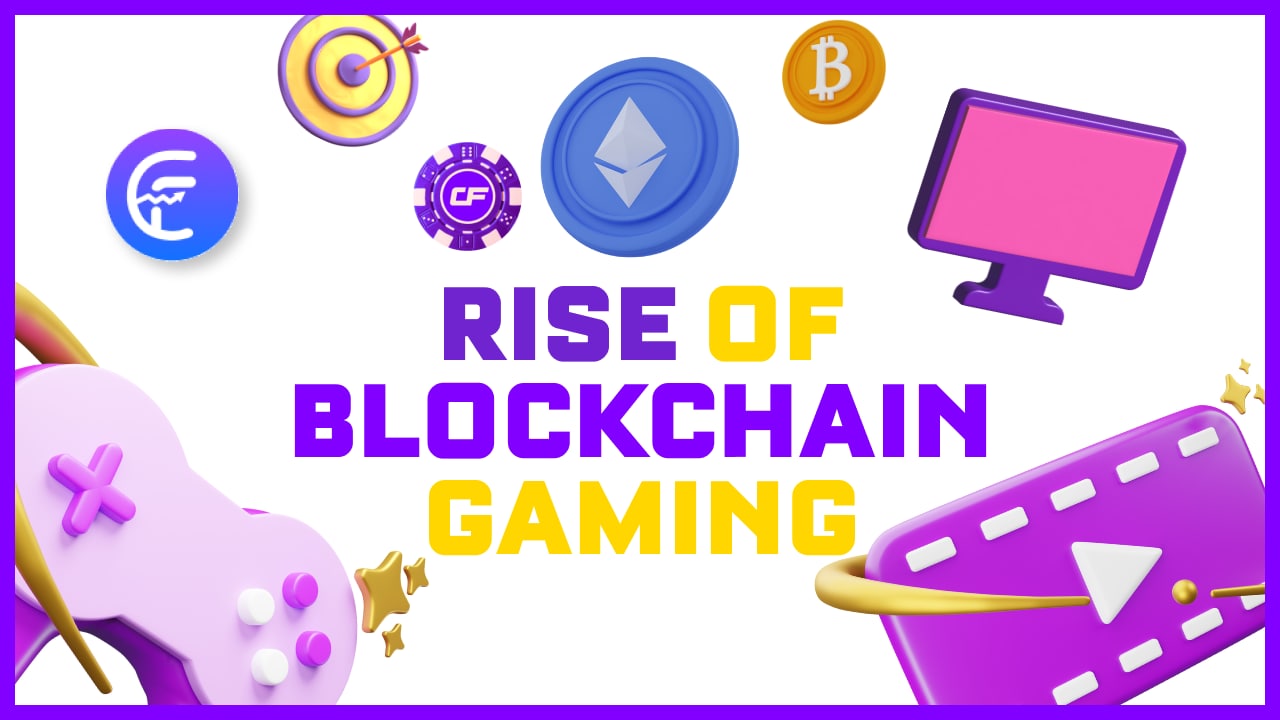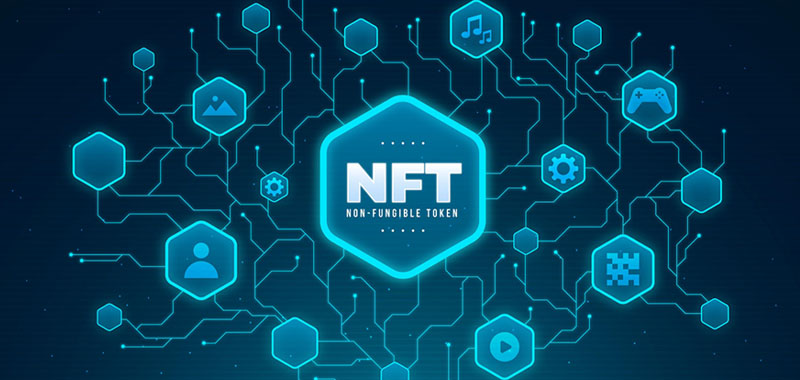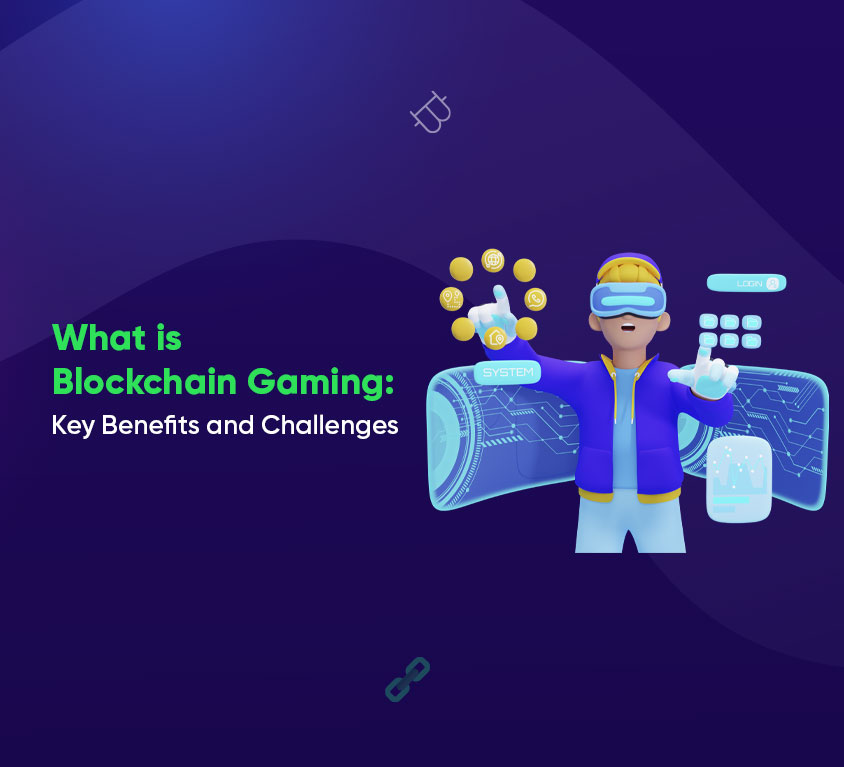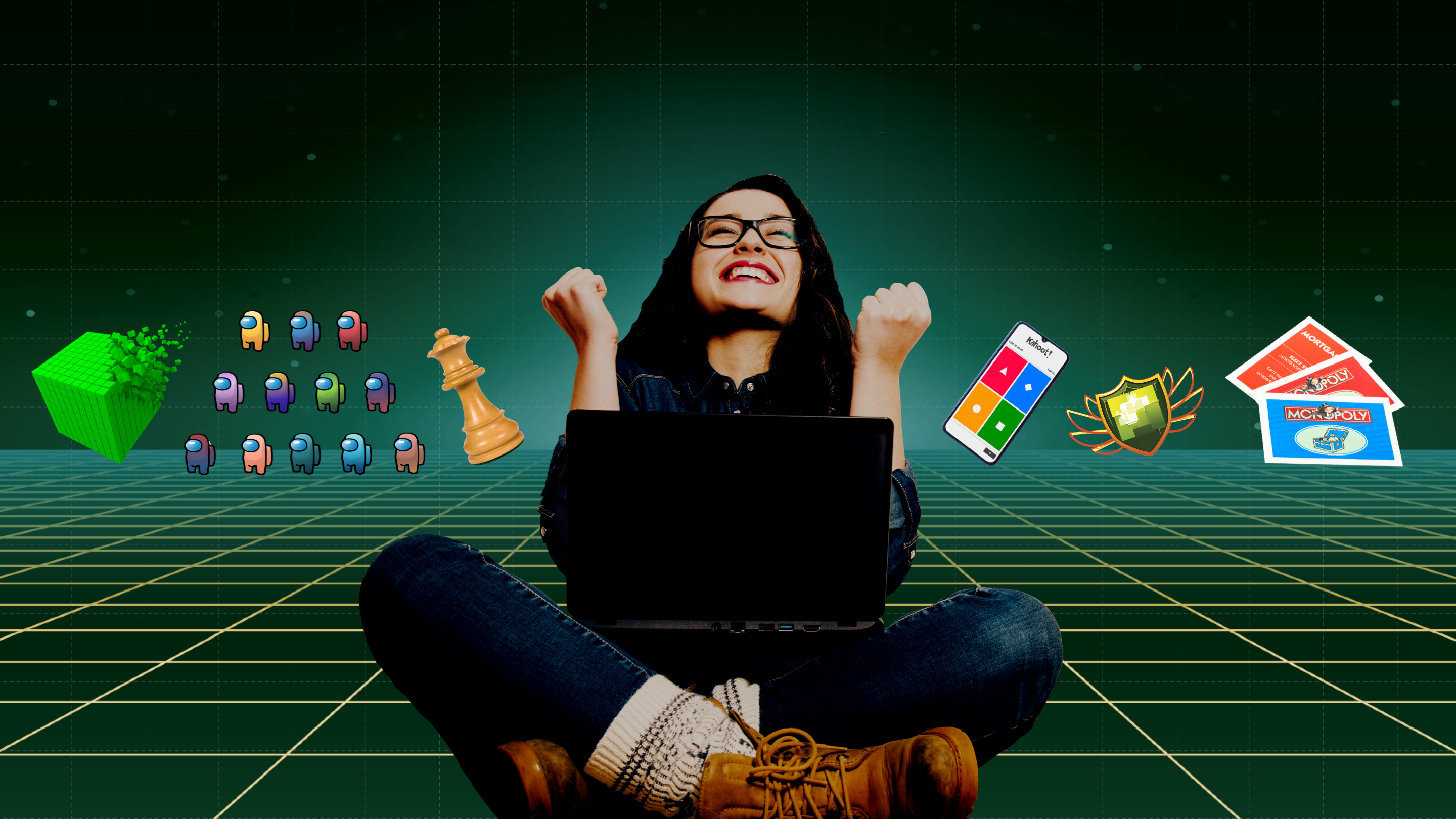Blockchain gaming is stirring a revolution within the gaming industry, leveraging decentralized technology to redefine the way players interact with virtual worlds. As this innovative wave gains momentum, questions abound regarding its authenticity – is it a genuine boom, reshaping the gaming landscape, or just another speculative bubble waiting to burst? This article delves into the nuanced perspectives of industry experts, exploring the potential, challenges, and uncertain future of blockchain gaming.
The Rise of Blockchain Gaming:

Blockchain gaming stands at the intersection of decentralized technology and interactive entertainment, offering gamers true ownership of in-game assets through the advent of non-fungible tokens (NFTs). Pioneering games like Axie Infinity showcase the potential for play-to-earn models, where players can earn cryptocurrency by actively participating in the game environment. This transformative approach has garnered widespread attention, with players and developers alike exploring the possibilities of decentralized finance (DeFi) elements within gaming ecosystems.
The integration of blockchain has fueled the emergence of novel gaming experiences, creating an environment where digital assets are not just tradable commodities but represent a tangible ownership paradigm for gamers.
Play-to-Earn: A Game-Changer or Short-Term Trend?

At the heart of the blockchain gaming surge is the play-to-earn model, a revolutionary concept that allows gamers to earn cryptocurrency as they engage with the game. While this model has attracted a considerable user base seeking alternative revenue streams, concerns linger about its long-term viability. Critics argue that sustaining play-to-earn models relies heavily on a continuous influx of new players and investments, potentially making it susceptible to market volatility and diminishing returns over time.
Despite these concerns, proponents emphasize the empowerment of gamers through direct financial incentives, challenging traditional gaming models. The debate surrounding the play-to-earn paradigm underscores the need for a balanced approach that aligns incentives for both players and developers to ensure the sustainable growth of blockchain gaming.
NFTs and Digital Asset Ownership:

The introduction of NFTs in blockchain gaming has fundamentally altered the landscape of digital asset ownership. Gamers can now possess, trade, and utilize in-game items across different platforms, fostering an interoperable virtual economy. This newfound ownership not only empowers players but also provides an avenue for game developers and artists to monetize their creations directly.
Despite the groundbreaking nature of NFTs, skeptics question their long-term viability within gaming. Concerns range from the environmental impact of blockchain networks to market oversaturation and potential legal disputes over intellectual property rights. Navigating these challenges will be pivotal in determining whether NFTs can sustainably integrate into the broader gaming ecosystem.
Blockchain Gaming Challenges:

While the potential of blockchain gaming is undeniable, it faces several critical challenges that could impact its mainstream adoption. Scalability issues, high transaction fees, and environmental concerns associated with energy-intensive blockchain networks are significant hurdles that must be addressed for the industry to thrive. Overcoming these challenges requires collaborative efforts from developers, investors, and the wider gaming community to create a more sustainable and accessible blockchain gaming environment.
The industry’s ability to tackle these obstacles head-on will determine whether blockchain gaming can evolve from a niche phenomenon to a mainstream force, shaping the future of interactive entertainment.
Investor Speculation and Market Dynamics:

The influx of speculative capital into the gaming space has brought both excitement and skepticism. Investors seeking the next big trend have fueled rapid growth, but concerns linger about market dynamics and the potential formation of a speculative bubble. Experts caution against blind investment, urging a nuanced approach that distinguishes between genuine innovation and market hype.
As gaming continues to attract attention from traditional investors and gaming enthusiasts alike, understanding the delicate balance between speculation and genuine value creation is crucial for the sustainable growth of the industry.
Integration with Traditional Gaming:

The future success of gaming may hinge on its ability to seamlessly integrate with traditional gaming platforms. Industry leaders are actively exploring ways to bridge the gap, aiming to bring the benefits of decentralized technology to a broader audience. Successful integration could be a key factor in determining whether blockchain gaming remains a niche trend or becomes an integral part of the broader gaming landscape.
The collaboration between blockchain and traditional represents a pivotal moment in the industry’s evolution, as it strives to offer players a diverse and engaging gaming experience that combines the best of both worlds.
Governance and Decentralization Challenges:
The promise of decentralized governance in blockchain gaming introduces a paradigm shift in decision-making structures. While it empowers users with a say in the development process, challenges arise in establishing effective governance mechanisms. Striking a balance between decentralization and avoiding potential governance gridlocks is crucial for ensuring the longevity of gaming ecosystems. Developers must navigate the complexities of decentralized decision-making to create sustainable and adaptable governance models that truly empower the gaming community.
Additionally, concerns persist about the potential for power concentration within a few influential entities, even in decentralized systems. Overcoming these challenges requires ongoing collaboration between developers, players, and stakeholders to refine governance structures that align with the principles of transparency, fairness, and community participation.
Blockchain Gaming Security Concerns:
As it gains traction, security becomes a paramount concern. The integration of blockchain introduces new attack vectors, such as smart contract vulnerabilities and potential hacking attempts. Developers face the challenge of fortifying their platforms against these threats to ensure a secure and trustworthy gaming environment.
To build user confidence, industry-wide standards for security practices must be established. Regular audits, robust encryption protocols, and proactive measures against emerging threats are essential elements in addressing security concerns. As gaming continues to evolve, a collective commitment to enhancing security measures will be pivotal in fostering trust among players and maintaining the integrity of decentralized gaming platforms.
Environmental Impact of Blockchain Networks:
The environmental impact of blockchain networks, particularly those utilizing energy-intensive Proof-of-Work (PoW) consensus mechanisms, has come under scrutiny. As the gaming industry increasingly adopts blockchain technology, there is a growing responsibility to explore and implement eco-friendly alternatives. Transitioning towards more sustainable consensus mechanisms, such as Proof-of-Stake (PoS), could significantly reduce the carbon footprint associated with blockchain gaming.
Moreover, the industry is witnessing a surge in eco-conscious gaming communities that demand sustainable practices. Developers and blockchain networks must collaborate to address these concerns, fostering innovation in energy-efficient protocols and minimizing the environmental impact of blockchain gaming to align with global sustainability goals.
Community Building and Engagement:
The success of it heavily relies on fostering vibrant and engaged communities. Unlike traditional gaming models, blockchain gaming encourages active participation from users, whether through governance decisions, collaborative creation, or community-driven events. Developers must prioritize community-building efforts to ensure a loyal and enthusiastic user base.
Effective communication channels, community feedback mechanisms, and initiatives that incentivize user involvement are essential components of successful community engagement. Nurturing a sense of belonging and shared ownership within the gaming community not only enhances the gaming experience but also contributes to the overall sustainability and growth of blockchain gaming ecosystems. Developers who prioritize community-building will likely see increased adoption and longevity for their blockchain gaming projects.
Cross-Platform Interoperability:
Ensuring seamless interoperability between blockchain gaming platforms and traditional gaming ecosystems is a critical challenge. As the industry strives for widespread adoption, developers must address technical barriers and collaborate on standards that facilitate cross-platform compatibility. Bridging the gap between blockchain and traditional gaming experiences will be essential for attracting a broader audience.
Innovations like blockchain-based cross-chain protocols and interoperable standards are emerging to tackle this challenge. As developers actively pursue solutions, the successful integration of blockchain gaming into mainstream gaming hinges on creating a cohesive experience that transcends platform boundaries.
Regulatory Uncertainty:
The regulatory landscape surrounding it is complex and continually evolving. Navigating legal uncertainties, such as taxation, intellectual property rights, and compliance with existing gaming regulations, poses challenges for developers and investors alike. A clear and supportive regulatory framework is crucial to foster confidence and enable the sustainable growth of blockchain gaming.
Developers must collaborate with regulatory bodies to establish guidelines that balance innovation with consumer protection. Proactive engagement in shaping favorable regulations will not only legitimize but also contribute to its long-term viability.
Educating Traditional Gamers:
The successful integration of blockchain gaming relies on educating traditional gamers about the benefits and intricacies of decentralized technology. Overcoming skepticism and demystifying blockchain concepts require concerted efforts from developers, influencers, and the wider gaming community. Educational initiatives, tutorials, and user-friendly interfaces can play a pivotal role in bridging the knowledge gap and fostering a more inclusive gaming ecosystem.
As gaming projects evolve, prioritizing educational outreach becomes essential to dispel misconceptions and encourage traditional gamers to explore the unique opportunities presented by decentralized gaming platforms.
Balancing Innovation and Stability:
Striking the right balance between innovation and platform stability is a delicate task for developers. While pushing the boundaries of technology is essential for the evolution of blockchain gaming, ensuring a stable and user-friendly experience is equally crucial. Continuous updates and improvements must be implemented with caution to avoid disruptions and maintain player trust.
Developers need to adopt agile development methodologies that allow for innovation while prioritizing user experience and platform stability. Finding this equilibrium is essential for sustaining the momentum of blockchain gaming without compromising reliability.
Gaming Industry Collaboration:
Collaboration between blockchain gaming projects and established gaming industry players is a key factor in determining the sector’s future. Partnerships, acquisitions, and alliances can provide synergies that accelerate the integration of blockchain technology into mainstream gaming. Encouraging dialogue between traditional gaming studios and blockchain innovators will be instrumental in fostering an environment of mutual growth and understanding.
Industry collaboration also opens avenues for shared resources, cross-promotions, and the exchange of best practices, ultimately contributing to the maturation of blockchain gaming as a formidable player in the broader gaming landscape.
User Experience Enhancement:
The user experience (UX) is paramount in any gaming environment, and blockchain gaming is no exception. Developers face the challenge of enhancing UX by minimizing transaction complexities, reducing latency, and optimizing overall gameplay. Streamlining user interactions with blockchain elements is crucial for attracting and retaining a diverse player base, including those unfamiliar with blockchain technology.
Incorporating intuitive interfaces, seamless onboarding processes, and minimizing blockchain-related jargon are essential steps toward improving UX. As blockchain gaming projects evolve, prioritizing user-centric design principles becomes a competitive advantage in an increasingly crowded market.
Evolving Business Models:
Blockchain gaming challenges traditional revenue models prevalent in the gaming industry. Developers need to explore sustainable business models beyond the conventional pay-to-play or freemium structures. The rise of NFTs and play-to-earn models opens up new avenues, but striking a balance that ensures profitability for developers while providing value for players remains an ongoing challenge.
Experimentation with innovative monetization strategies, such as decentralized autonomous organizations (DAOs) and community-driven funding, can pave the way for groundbreaking business models that align with the decentralized ethos of blockchain gaming.
Social Impact and Inclusivity:
Blockchain gaming has the potential to bring about positive social impact by fostering inclusivity and empowering diverse communities. Developers must actively work to eliminate barriers to entry, ensuring that blockchain gaming is accessible to a global audience irrespective of geographical, economic, or cultural factors. Prioritizing diversity in characters, storylines, and themes can create more inclusive and representative gaming experiences.
By leveraging the decentralized nature of blockchain technology, developers can contribute to social impact initiatives, philanthropy, and community-driven projects, demonstrating the transformative potential of blockchain gaming beyond entertainment.
Decentralized Identity Solutions:
The integration of decentralized identity solutions is pivotal for ensuring user privacy, security, and ownership in blockchain gaming. Implementing user-friendly identity management systems that give players control over their personal data while complying with regulatory requirements is an ongoing challenge.
Blockchain’s potential for providing secure and verifiable digital identities can enhance trust within gaming communities. Developers must actively explore and implement decentralized identity solutions to address growing concerns about data privacy and security.
Evolution of Blockchain Infrastructure:
The rapid evolution of blockchain technology itself poses challenges for developers to stay abreast of advancements in infrastructure. Shifting from traditional blockchains to more scalable, eco-friendly, and feature-rich alternatives requires careful consideration and adaptation.
Adopting emerging technologies, such as layer 2 scaling solutions, sidechains, and improved consensus mechanisms, is crucial for enhancing the overall performance, scalability, and sustainability of blockchain gaming platforms.
Anti-Cheating Measures:
Maintaining fair play and preventing cheating within blockchain gaming ecosystems is a persistent concern. As play-to-earn models incentivize users to maximize rewards, developers must implement robust anti-cheating measures to uphold the integrity of the gaming experience.
Combining blockchain’s transparency with sophisticated anti-cheat technologies can create a secure and equitable gaming environment, ensuring that players are rewarded based on genuine contributions to the game.
Cultural Integration in Game Design:
Blockchain gaming’s global nature necessitates cultural sensitivity in game design. Developers must consider diverse cultural nuances, preferences, and sensitivities to create immersive experiences that resonate with players worldwide. Incorporating culturally relevant themes, narratives, and characters contributes to the broader appeal of blockchain gaming.
Emphasizing cultural integration not only enhances the entertainment value of games but also fosters a deeper connection between players and the diverse virtual worlds created by blockchain gaming projects.
Transparent Game Economies:
Blockchain’s transparency offers an opportunity to create open and transparent in-game economies. However, developers must strike a delicate balance between transparency and protecting sensitive economic data to prevent manipulation and exploitation. Implementing systems that provide visibility into tokenomics, asset circulation, and economic governance can foster trust among players.
By emphasizing transparency in game economies, developers can differentiate their projects and establish a foundation of trust, attracting players who value openness and accountability.
Balancing Innovation and Tradition:
Maintaining a delicate equilibrium between innovative blockchain features and traditional gaming elements is crucial for widespread acceptance. Straying too far from established gaming conventions may alienate mainstream gamers, while embracing blockchain’s transformative potential is essential for differentiation.
Developers need to carefully integrate blockchain technology without overwhelming players, gradually introducing innovative features that enhance rather than disrupt the traditional gaming experience. Balancing innovation and tradition ensures a smoother transition for both veteran gamers and those newly introduced to blockchain gaming.
These ongoing challenges underscore the dynamic nature of the blockchain gaming landscape, where developers continually navigate complexities to realize the full potential of decentralized gaming ecosystems. As the industry matures, addressing these challenges will be instrumental in solidifying blockchain gaming as a lasting and transformative force in the gaming world.
User Onboarding and Education:
User onboarding remains a pivotal challenge as blockchain gaming seeks wider adoption. Developers must simplify the onboarding process, making it intuitive for users unfamiliar with blockchain technology. Educational initiatives, interactive tutorials, and easily accessible resources are crucial in guiding new players through the intricacies of blockchain gaming, fostering a more inclusive and informed community.
Effective user onboarding not only accelerates the integration of non-crypto enthusiasts. But also contributes to the overall growth and sustainability of the blockchain gaming ecosystem.
Community Governance Evolution:
As blockchain gaming projects implement decentralized governance, ongoing evolution and refinement are essential. The challenge lies in striking a balance between community-driven decision-making and maintaining a cohesive vision for the game. Developers need to actively engage with the community, adapt governance models based on feedback, and foster a collaborative environment where all stakeholders have a voice. Continuous refinement of community governance ensures a democratic and resilient foundation for the sustainable growth of blockchain gaming projects.
Integration of Virtual Reality (VR) and Augmented Reality (AR):
The integration of blockchain gaming with virtual reality (VR) and augmented reality (AR) presents exciting opportunities but comes with its set of challenges. Developers need to seamlessly merge these immersive technologies with blockchain features, enhancing the overall gaming experience. Overcoming technical hurdles, optimizing performance, and ensuring widespread accessibility will be key factors in successfully integrating VR and AR into blockchain gaming. The combination of blockchain, VR, and AR has the potential to redefine gaming, offering players unprecedented levels of immersion and interaction.
Regulatory Compliance and Cross-Border Challenges:
Navigating diverse regulatory landscapes across different countries poses a substantial challenge for blockchain gaming. Developers must ensure compliance with varying legal frameworks while addressing cross-border challenges related to licensing, taxation, and content restrictions. Establishing a global standard that accommodates regulatory diversity is imperative for fostering a truly borderless gaming ecosystem.
Collaboration with regulatory bodies, industry associations, and legal experts is essential in navigating. The complex regulatory terrain and fostering a conducive environment for blockchain gaming’s global expansion.
Sustainable Blockchain Gaming Initiatives:
Sustainability is becoming a central focus in the blockchain gaming space. Developers are challenged to create initiatives that not only consider environmental impact but also contribute positively to social causes. Implementing eco-friendly consensus mechanisms, supporting charitable projects, and embracing social responsibility will be key in positioning blockchain gaming as a force for positive change.
Sustainable initiatives not only align with growing environmental and social consciousness but also resonate with players who seek meaningful contributions from the gaming industry.
Long-Term Player Retention Strategies:
Retaining players in the long term poses an ongoing challenge for blockchain gaming projects. Developers must implement effective strategies that go beyond initial excitement, such as regular content updates, engaging events, and incentives for continued participation. Building a vibrant and loyal player community requires sustained efforts to provide a dynamic and evolving gaming experience. Long-term player retention strategies are essential for the continued success and growth of blockchain gaming projects, ensuring a thriving ecosystem that stands the test of time.
In conclusion,
The challenges facing blockchain gaming are multifaceted and dynamic, reflecting the industry’s rapid evolution. As developers, players, and stakeholders collectively address these challenges, the potential for blockchain gaming to transform the gaming landscape becomes increasingly promising. The continuous pursuit of innovation, user-centric design, regulatory collaboration, and sustainability will shape the future trajectory of blockchain gaming, determining whether it stands as a fleeting trend or establishes itself as a revolutionary force in the gaming industry.
FAQ’s
Blockchain gaming refers to the integration of blockchain technology in video games, utilizing decentralized systems to enhance gameplay, ownership of in-game assets, and introduce innovative features like play-to-earn models.
Play-to-earn models allow gamers to earn cryptocurrency by actively participating in the game. This includes completing in-game tasks, achieving milestones, and contributing to the overall gaming ecosystem.
Play-to-earn models allow gamers to earn cryptocurrency by actively participating in the game. This includes completing in-game tasks, achieving milestones, and contributing to the overall gaming ecosystem.
The energy consumption of blockchain networks, particularly those using Proof-of-Work (PoW) consensus mechanisms, raises environmental concerns. Efforts are being made to explore more sustainable alternatives like Proof-of-Stake (PoS).
CHECK OUT THE LATEST CRYPTO UPDATES ONLY ON : cryptoupdatess.xyz

